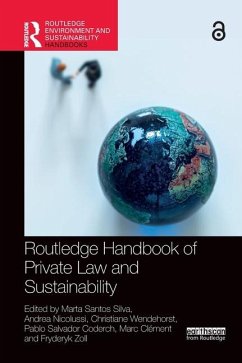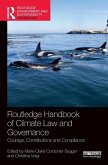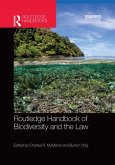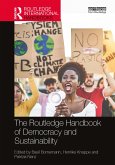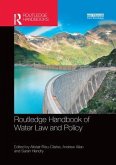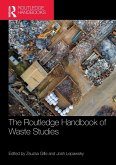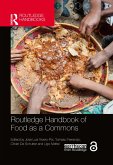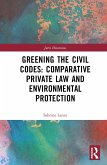Routledge Handbook of Private Law and Sustainability
Herausgegeben:Silva, Marta Santos; Nicolussi, Andrea; Wendehorst, Christiane; Salvador Coderch, Pablo; Clément, Marc; Zoll, Fryderyk
Routledge Handbook of Private Law and Sustainability
Herausgegeben:Silva, Marta Santos; Nicolussi, Andrea; Wendehorst, Christiane; Salvador Coderch, Pablo; Clément, Marc; Zoll, Fryderyk
- Gebundenes Buch
- Merkliste
- Auf die Merkliste
- Bewerten Bewerten
- Teilen
- Produkt teilen
- Produkterinnerung
- Produkterinnerung
The Routledge Handbook of Private Law and Sustainability reflects on how the law can help tackle the current environmental challenges and make our societies more resilient to future crises.
Sustainability has been high on the political agenda since the approval of the Sustainable Development Goals in 2015 and the EU Green Deal in 2019. The Green Agenda aims at making Europe the first climate neutral continent by 2050, but humanity persists in an ecological overshoot that puts at risk the survival of species, including that of our own. Drawing together a selection of leading thinkers in the…mehr
Andere Kunden interessierten sich auch für
![Routledge Handbook of Climate Law and Governance Routledge Handbook of Climate Law and Governance]() Routledge Handbook of Climate Law and Governance237,99 €
Routledge Handbook of Climate Law and Governance237,99 €![Routledge Handbook of Biodiversity and the Law Routledge Handbook of Biodiversity and the Law]() Routledge Handbook of Biodiversity and the Law49,99 €
Routledge Handbook of Biodiversity and the Law49,99 €![The Routledge Handbook of Democracy and Sustainability The Routledge Handbook of Democracy and Sustainability]() The Routledge Handbook of Democracy and Sustainability235,99 €
The Routledge Handbook of Democracy and Sustainability235,99 €![Routledge Handbook of Water Law and Policy Routledge Handbook of Water Law and Policy]() Routledge Handbook of Water Law and Policy53,99 €
Routledge Handbook of Water Law and Policy53,99 €![The Routledge Handbook of Waste Studies The Routledge Handbook of Waste Studies]() The Routledge Handbook of Waste Studies49,99 €
The Routledge Handbook of Waste Studies49,99 €![Routledge Handbook of Food as a Commons Routledge Handbook of Food as a Commons]() Routledge Handbook of Food as a Commons49,99 €
Routledge Handbook of Food as a Commons49,99 €![Greening the Civil Codes Greening the Civil Codes]() Sabrina LanniGreening the Civil Codes181,99 €
Sabrina LanniGreening the Civil Codes181,99 €-
-
-
The Routledge Handbook of Private Law and Sustainability reflects on how the law can help tackle the current environmental challenges and make our societies more resilient to future crises.
Sustainability has been high on the political agenda since the approval of the Sustainable Development Goals in 2015 and the EU Green Deal in 2019. The Green Agenda aims at making Europe the first climate neutral continent by 2050, but humanity persists in an ecological overshoot that puts at risk the survival of species, including that of our own. Drawing together a selection of leading thinkers in the field, this Handbook provides a curated overview of the most recent and relevant discussions for private lawyers related to environmental and sustainability concerns. The authors delve into case study examples from 20 countries in Europe and beyond and discuss a wide range of issues, including new property law and consumer law paradigms, the use of legal tech for promoting sustainable property management, strategies for fighting planned obsolescence, eco design, the servitisation economy, advances on corporate climate litigation and mandated green private sludges. Overall, the volume is designed to empower new generations of legal scholars to take an active role in the transition to a more sustainable future. It will also assist policymakers in producing better policy, through pinpointing the main legal issues that need to be addressed and offering a comparative overview of legal solutions and best practices.
Divided into six key parts and overseen by a team of internationally recognised expert editors, this Handbook will be an essential resource for students, scholars, private lawyers and policymakers who wish to have a comprehensive, fundamental overview of how environmental sustainability concerns reflect on private law.
Sustainability has been high on the political agenda since the approval of the Sustainable Development Goals in 2015 and the EU Green Deal in 2019. The Green Agenda aims at making Europe the first climate neutral continent by 2050, but humanity persists in an ecological overshoot that puts at risk the survival of species, including that of our own. Drawing together a selection of leading thinkers in the field, this Handbook provides a curated overview of the most recent and relevant discussions for private lawyers related to environmental and sustainability concerns. The authors delve into case study examples from 20 countries in Europe and beyond and discuss a wide range of issues, including new property law and consumer law paradigms, the use of legal tech for promoting sustainable property management, strategies for fighting planned obsolescence, eco design, the servitisation economy, advances on corporate climate litigation and mandated green private sludges. Overall, the volume is designed to empower new generations of legal scholars to take an active role in the transition to a more sustainable future. It will also assist policymakers in producing better policy, through pinpointing the main legal issues that need to be addressed and offering a comparative overview of legal solutions and best practices.
Divided into six key parts and overseen by a team of internationally recognised expert editors, this Handbook will be an essential resource for students, scholars, private lawyers and policymakers who wish to have a comprehensive, fundamental overview of how environmental sustainability concerns reflect on private law.
Produktdetails
- Produktdetails
- Routledge Environment and Sustainability Handbooks
- Verlag: Routledge / Taylor & Francis
- Seitenzahl: 640
- Erscheinungstermin: 5. Juni 2024
- Englisch
- Abmessung: 260mm x 183mm x 39mm
- Gewicht: 1340g
- ISBN-13: 9781032662008
- ISBN-10: 103266200X
- Artikelnr.: 70337951
- Herstellerkennzeichnung
- Libri GmbH
- Europaallee 1
- 36244 Bad Hersfeld
- gpsr@libri.de
- Routledge Environment and Sustainability Handbooks
- Verlag: Routledge / Taylor & Francis
- Seitenzahl: 640
- Erscheinungstermin: 5. Juni 2024
- Englisch
- Abmessung: 260mm x 183mm x 39mm
- Gewicht: 1340g
- ISBN-13: 9781032662008
- ISBN-10: 103266200X
- Artikelnr.: 70337951
- Herstellerkennzeichnung
- Libri GmbH
- Europaallee 1
- 36244 Bad Hersfeld
- gpsr@libri.de
Marta Santos Silva is a Postdoctoral Researcher at the Research Center for Justice and Governance at the University of Minho, and an Affiliated Researcher at the Maastricht European Private Law Institute and the Centre for European Law and Politics at the University of Bremen. Prior to her current role, she worked at Maastricht University and as an affiliated senior researcher at KU Leuven researching at the intersection between private law and sustainability studies. She gained experience working in Brussels for a consultancy working with the European institutions. She was appointed a member of the European Commission's Expert Group on Liability and New Technologies (Product Liability Formation) and is an elected European Law Institute Council member. Andrea Nicolussi is a Full Professor of Civil Law at the Law Faculty of the Catholic University of Milan, where he teaches comparative private law and family law. His published works focus on unjustified enrichment, contract law and tort law, as well as biolaw and family law. He has taken part in international collaborations such as the Study Group on a European Civil Code and the Eusoco project and was a member of the National Bioethics Committee. Christiane Wendehorst is a Professor of Law at the University of Vienna. She is a member of the Academia Europaea, the Austrian Academy of Sciences, the International Academy of Comparative Law, the American Law Institute and numerous international research groups and advisory bodies. Before going to Vienna, she held full professorships in Germany and served as the Managing Director of the SinöGerman Institute for Legal Studies. Professor Wendehorst was the President of the ELI, was one of its Founding Members and is today the ELI's Scientific Director. Pablo Salvador Coderch studied law and economics at the University of Barcelona. He is a Cofounder of and Emeritus Professor at the Pompeu Fabra University, Barcelona. Since 1995, he is of counsel at Cuatrecasas Abogados. He is a member of the ALI, the ELI and the International Academy of Comparative Law and founder of InDret. He writes and teaches civil law, civil constitutional law, legislative drafting and comparative law of torts and contracts. Marc Clément is, since September 2018, the presiding judge at the Administrative Tribunal of Lyon (France). In addition, he is, since 2014, a member of the French Environmental Authority. He has experience working as a lawyer at the DG Environment of the European Commission and as a legal adviser of the European Environment Agency. He published in 2010 the book "Environment European Law" and contributed extensively to books in the field of environmental law. Fryderyk Zoll is a doctor honoris causa by the West¿Ukrainian National University in Ternopil, Professor at the Chair of Civil Law at Jagiellonian University in Kraków and the European Legal Studies Institute, University of Osnabrück. He is the leading researcher of numerous Polish, German and EU grants, a member of numerous academic associations and a vice¿chairperson of the Committee for the Defence of Democracy (KOD) regional board in Lesser Poland. He is a former member of the European Law Institute's Executive Committee, the Common Frame of Reference and the Committee of the Acquis Group drafting teams, as well as the Codification Commission at the Polish Ministry of Justice. He has authored more than 200 scientific publications in European private law, ecologisation of private law, consumer law, comparative law, legal education and judicial independence.
PART 1 Greening Private Law and in Particular the Law of Obligations
1 Private Law and Environmental Sustainability
Barbara Pozzo
2 Towards a Sustainable Interpretation of Standard Contract Terms?
Dario Hug
3 Environmental Delicts and Post Communist Private Law in Bulgaria: Time for Reforms in View of UN's Sustainable Development Goals and the European Green Deal?
Radosveta Vassileva
4 Private Law as a Tool to Overcome Split Incentives on Energy Efficiency in the Residential Rental Market
Rosa M. Garcia-Teruel
5 Who's Afraid of Sustainability? A Primer for Mainstreaming Sustainability in Private Law Education
Candida Leone
PART 2 Fostering Environmental Protection through Consumer Law
6 Various Approaches to 'Greening' Consumer Sales Law
Fryderyk Zoll, Katarzyna Poludniak Gierz, Wojciech Banczyk and Maciej Bujalski
7 The (Un)sustainability of the Sale of Goods in Directive (EU) 2019/771
Maria Miguel Oliveira da Silva and Jorge Morais Carvalho
8 The Blinding Effect of EU Consumer Policy Overshadows the Role of Consumer Law in Delivering the Green Transition
Lucila de Almeida and Fabrizio Esposito
9 Revisiting European Consumer Protection through the Lens of Sustainable Markets
Mireia Artigot Golobardes
10 Sustainability Challenges in Slovenian Private Law: A Focus on the Nature of Goods
Petra Weingerl
PART 3 Coordinating Public and Private Sustainability Law in Europe
11 Sustainability as a Regulatory Principle and the Rules of Economic Development: The Italian Legal System
Guido Alpa
12 Sustainability and the Impact of the Court of Justice of the EU
Verica Trstenjak
13 Private Law Responses to Imperfect Regulation in International Public Law - The Case of Vessel Recycling
Kristina Siig
14 Amendments to Articles 9 and 41 of the Italian Constitution on the Protection of the Environment and Intergenerational Responsibility
Roberta Calvano
15 The Case for a Stable Climate: The Urgent Need for a Subjective (Personality?) Right in the Portuguese Legal System
Maria Regina Redinha and Maria Raquel Guimarães
PART 4 Conciliating Property Rights and Environmental Protection
16 Property Law and (More Than One Notion of) Sustainability: A New Field
Björn Hoops
17 A New Paradigm of Ownership in Italian Private Law?
Francesco Zecchin
18 Using Tokenisation in Support of a 'Superficies Sustainable': A Dutch Case Study on LegalTech to Support Sustainability Goals
Jasper Verstappen and Tim van Zuijlen
19 The Ecological Function of Property in the Constitution of Slovenia
Miha Juhart
20 Electromobility Reconstruction of Buildings and Sustainable Property Management
Tatjana Josipovic
21 Distributional Effects of Disaster Management
Willemijn van Doorn-Hoekveld and Marleen van Rijswick
PART 5 Green Economy Transition: Sustainable Consumption and Production
22 The Interplay between Ecodesign and Consumer Sales Law
Victor Mehnert and Hans-W. Micklitz
23 Cooling Off Hot Deals: A Plea for Green Sludge in Distance Sales Contracts
Marta Santos Silva and Tomàs Gabriel Garcia Mico
24 How Can We Persuade Consumers to Purchase More Sustainable Products? A Review of European Legal Developments
Carl Dalhammar and Eléonore Maitre-Ekern
25 The Battle against Planned Obsolescence - Legal Remedies
Denis Philippe
26 Leveraging Regulatory Measures to Enhance the Sustainability Potential of Servitisation in the EU
Janja Hojnik
27 Private Standardisation for Sustainability: Opportunities and Cases
Yayun Shen and Michael Faure
PART VI Dealing with Climate Justice and Corporate Responsibility
28 Sustainability and Private International Law
Ralf Michaels and Samuel Zeh
29 Individual Redress and Ecological Claims - New Wine into Old Wineskins?
Sandra Passinhas
30 The EU Green Deal and the Sustainability of Corporate Activities
Hugo-Maria Schally
31 Corporate Purpose as a Conduit for Sustainability in Corporate Governance
Iain MacNeil and Irene-marie Esser
32 Online Platforms and Sustainability: How to Engage Digital Intermediaries in Sustainability Goals?
Carlos Gómez Ligüerre and Lela Mélon
33 The Sustainability Obligation in Global Value Chain Contracts
Jakub Blazej Zwierzchowski and Ewa Rott-Pietrzyk
34 Contract Law and Sustainability of Global Value Chains: Assessing the Proposal for an EU Corporate Sustainability Due Diligence Directive from a Contract Law Perspective
Rebecca Ravalli
35 Environmental Litigation: Is It a Matter of Public or Private Law? An Exploration of Cross Fertilisation of Environmental Law Concepts in the Context of French Case Law
Marc Clément
Epilogue: A Marble World and Humans Shaking Hands
1 Private Law and Environmental Sustainability
Barbara Pozzo
2 Towards a Sustainable Interpretation of Standard Contract Terms?
Dario Hug
3 Environmental Delicts and Post Communist Private Law in Bulgaria: Time for Reforms in View of UN's Sustainable Development Goals and the European Green Deal?
Radosveta Vassileva
4 Private Law as a Tool to Overcome Split Incentives on Energy Efficiency in the Residential Rental Market
Rosa M. Garcia-Teruel
5 Who's Afraid of Sustainability? A Primer for Mainstreaming Sustainability in Private Law Education
Candida Leone
PART 2 Fostering Environmental Protection through Consumer Law
6 Various Approaches to 'Greening' Consumer Sales Law
Fryderyk Zoll, Katarzyna Poludniak Gierz, Wojciech Banczyk and Maciej Bujalski
7 The (Un)sustainability of the Sale of Goods in Directive (EU) 2019/771
Maria Miguel Oliveira da Silva and Jorge Morais Carvalho
8 The Blinding Effect of EU Consumer Policy Overshadows the Role of Consumer Law in Delivering the Green Transition
Lucila de Almeida and Fabrizio Esposito
9 Revisiting European Consumer Protection through the Lens of Sustainable Markets
Mireia Artigot Golobardes
10 Sustainability Challenges in Slovenian Private Law: A Focus on the Nature of Goods
Petra Weingerl
PART 3 Coordinating Public and Private Sustainability Law in Europe
11 Sustainability as a Regulatory Principle and the Rules of Economic Development: The Italian Legal System
Guido Alpa
12 Sustainability and the Impact of the Court of Justice of the EU
Verica Trstenjak
13 Private Law Responses to Imperfect Regulation in International Public Law - The Case of Vessel Recycling
Kristina Siig
14 Amendments to Articles 9 and 41 of the Italian Constitution on the Protection of the Environment and Intergenerational Responsibility
Roberta Calvano
15 The Case for a Stable Climate: The Urgent Need for a Subjective (Personality?) Right in the Portuguese Legal System
Maria Regina Redinha and Maria Raquel Guimarães
PART 4 Conciliating Property Rights and Environmental Protection
16 Property Law and (More Than One Notion of) Sustainability: A New Field
Björn Hoops
17 A New Paradigm of Ownership in Italian Private Law?
Francesco Zecchin
18 Using Tokenisation in Support of a 'Superficies Sustainable': A Dutch Case Study on LegalTech to Support Sustainability Goals
Jasper Verstappen and Tim van Zuijlen
19 The Ecological Function of Property in the Constitution of Slovenia
Miha Juhart
20 Electromobility Reconstruction of Buildings and Sustainable Property Management
Tatjana Josipovic
21 Distributional Effects of Disaster Management
Willemijn van Doorn-Hoekveld and Marleen van Rijswick
PART 5 Green Economy Transition: Sustainable Consumption and Production
22 The Interplay between Ecodesign and Consumer Sales Law
Victor Mehnert and Hans-W. Micklitz
23 Cooling Off Hot Deals: A Plea for Green Sludge in Distance Sales Contracts
Marta Santos Silva and Tomàs Gabriel Garcia Mico
24 How Can We Persuade Consumers to Purchase More Sustainable Products? A Review of European Legal Developments
Carl Dalhammar and Eléonore Maitre-Ekern
25 The Battle against Planned Obsolescence - Legal Remedies
Denis Philippe
26 Leveraging Regulatory Measures to Enhance the Sustainability Potential of Servitisation in the EU
Janja Hojnik
27 Private Standardisation for Sustainability: Opportunities and Cases
Yayun Shen and Michael Faure
PART VI Dealing with Climate Justice and Corporate Responsibility
28 Sustainability and Private International Law
Ralf Michaels and Samuel Zeh
29 Individual Redress and Ecological Claims - New Wine into Old Wineskins?
Sandra Passinhas
30 The EU Green Deal and the Sustainability of Corporate Activities
Hugo-Maria Schally
31 Corporate Purpose as a Conduit for Sustainability in Corporate Governance
Iain MacNeil and Irene-marie Esser
32 Online Platforms and Sustainability: How to Engage Digital Intermediaries in Sustainability Goals?
Carlos Gómez Ligüerre and Lela Mélon
33 The Sustainability Obligation in Global Value Chain Contracts
Jakub Blazej Zwierzchowski and Ewa Rott-Pietrzyk
34 Contract Law and Sustainability of Global Value Chains: Assessing the Proposal for an EU Corporate Sustainability Due Diligence Directive from a Contract Law Perspective
Rebecca Ravalli
35 Environmental Litigation: Is It a Matter of Public or Private Law? An Exploration of Cross Fertilisation of Environmental Law Concepts in the Context of French Case Law
Marc Clément
Epilogue: A Marble World and Humans Shaking Hands
PART 1 Greening Private Law and in Particular the Law of Obligations
1 Private Law and Environmental Sustainability
Barbara Pozzo
2 Towards a Sustainable Interpretation of Standard Contract Terms?
Dario Hug
3 Environmental Delicts and Post Communist Private Law in Bulgaria: Time for Reforms in View of UN's Sustainable Development Goals and the European Green Deal?
Radosveta Vassileva
4 Private Law as a Tool to Overcome Split Incentives on Energy Efficiency in the Residential Rental Market
Rosa M. Garcia-Teruel
5 Who's Afraid of Sustainability? A Primer for Mainstreaming Sustainability in Private Law Education
Candida Leone
PART 2 Fostering Environmental Protection through Consumer Law
6 Various Approaches to 'Greening' Consumer Sales Law
Fryderyk Zoll, Katarzyna Poludniak Gierz, Wojciech Banczyk and Maciej Bujalski
7 The (Un)sustainability of the Sale of Goods in Directive (EU) 2019/771
Maria Miguel Oliveira da Silva and Jorge Morais Carvalho
8 The Blinding Effect of EU Consumer Policy Overshadows the Role of Consumer Law in Delivering the Green Transition
Lucila de Almeida and Fabrizio Esposito
9 Revisiting European Consumer Protection through the Lens of Sustainable Markets
Mireia Artigot Golobardes
10 Sustainability Challenges in Slovenian Private Law: A Focus on the Nature of Goods
Petra Weingerl
PART 3 Coordinating Public and Private Sustainability Law in Europe
11 Sustainability as a Regulatory Principle and the Rules of Economic Development: The Italian Legal System
Guido Alpa
12 Sustainability and the Impact of the Court of Justice of the EU
Verica Trstenjak
13 Private Law Responses to Imperfect Regulation in International Public Law - The Case of Vessel Recycling
Kristina Siig
14 Amendments to Articles 9 and 41 of the Italian Constitution on the Protection of the Environment and Intergenerational Responsibility
Roberta Calvano
15 The Case for a Stable Climate: The Urgent Need for a Subjective (Personality?) Right in the Portuguese Legal System
Maria Regina Redinha and Maria Raquel Guimarães
PART 4 Conciliating Property Rights and Environmental Protection
16 Property Law and (More Than One Notion of) Sustainability: A New Field
Björn Hoops
17 A New Paradigm of Ownership in Italian Private Law?
Francesco Zecchin
18 Using Tokenisation in Support of a 'Superficies Sustainable': A Dutch Case Study on LegalTech to Support Sustainability Goals
Jasper Verstappen and Tim van Zuijlen
19 The Ecological Function of Property in the Constitution of Slovenia
Miha Juhart
20 Electromobility Reconstruction of Buildings and Sustainable Property Management
Tatjana Josipovic
21 Distributional Effects of Disaster Management
Willemijn van Doorn-Hoekveld and Marleen van Rijswick
PART 5 Green Economy Transition: Sustainable Consumption and Production
22 The Interplay between Ecodesign and Consumer Sales Law
Victor Mehnert and Hans-W. Micklitz
23 Cooling Off Hot Deals: A Plea for Green Sludge in Distance Sales Contracts
Marta Santos Silva and Tomàs Gabriel Garcia Mico
24 How Can We Persuade Consumers to Purchase More Sustainable Products? A Review of European Legal Developments
Carl Dalhammar and Eléonore Maitre-Ekern
25 The Battle against Planned Obsolescence - Legal Remedies
Denis Philippe
26 Leveraging Regulatory Measures to Enhance the Sustainability Potential of Servitisation in the EU
Janja Hojnik
27 Private Standardisation for Sustainability: Opportunities and Cases
Yayun Shen and Michael Faure
PART VI Dealing with Climate Justice and Corporate Responsibility
28 Sustainability and Private International Law
Ralf Michaels and Samuel Zeh
29 Individual Redress and Ecological Claims - New Wine into Old Wineskins?
Sandra Passinhas
30 The EU Green Deal and the Sustainability of Corporate Activities
Hugo-Maria Schally
31 Corporate Purpose as a Conduit for Sustainability in Corporate Governance
Iain MacNeil and Irene-marie Esser
32 Online Platforms and Sustainability: How to Engage Digital Intermediaries in Sustainability Goals?
Carlos Gómez Ligüerre and Lela Mélon
33 The Sustainability Obligation in Global Value Chain Contracts
Jakub Blazej Zwierzchowski and Ewa Rott-Pietrzyk
34 Contract Law and Sustainability of Global Value Chains: Assessing the Proposal for an EU Corporate Sustainability Due Diligence Directive from a Contract Law Perspective
Rebecca Ravalli
35 Environmental Litigation: Is It a Matter of Public or Private Law? An Exploration of Cross Fertilisation of Environmental Law Concepts in the Context of French Case Law
Marc Clément
Epilogue: A Marble World and Humans Shaking Hands
1 Private Law and Environmental Sustainability
Barbara Pozzo
2 Towards a Sustainable Interpretation of Standard Contract Terms?
Dario Hug
3 Environmental Delicts and Post Communist Private Law in Bulgaria: Time for Reforms in View of UN's Sustainable Development Goals and the European Green Deal?
Radosveta Vassileva
4 Private Law as a Tool to Overcome Split Incentives on Energy Efficiency in the Residential Rental Market
Rosa M. Garcia-Teruel
5 Who's Afraid of Sustainability? A Primer for Mainstreaming Sustainability in Private Law Education
Candida Leone
PART 2 Fostering Environmental Protection through Consumer Law
6 Various Approaches to 'Greening' Consumer Sales Law
Fryderyk Zoll, Katarzyna Poludniak Gierz, Wojciech Banczyk and Maciej Bujalski
7 The (Un)sustainability of the Sale of Goods in Directive (EU) 2019/771
Maria Miguel Oliveira da Silva and Jorge Morais Carvalho
8 The Blinding Effect of EU Consumer Policy Overshadows the Role of Consumer Law in Delivering the Green Transition
Lucila de Almeida and Fabrizio Esposito
9 Revisiting European Consumer Protection through the Lens of Sustainable Markets
Mireia Artigot Golobardes
10 Sustainability Challenges in Slovenian Private Law: A Focus on the Nature of Goods
Petra Weingerl
PART 3 Coordinating Public and Private Sustainability Law in Europe
11 Sustainability as a Regulatory Principle and the Rules of Economic Development: The Italian Legal System
Guido Alpa
12 Sustainability and the Impact of the Court of Justice of the EU
Verica Trstenjak
13 Private Law Responses to Imperfect Regulation in International Public Law - The Case of Vessel Recycling
Kristina Siig
14 Amendments to Articles 9 and 41 of the Italian Constitution on the Protection of the Environment and Intergenerational Responsibility
Roberta Calvano
15 The Case for a Stable Climate: The Urgent Need for a Subjective (Personality?) Right in the Portuguese Legal System
Maria Regina Redinha and Maria Raquel Guimarães
PART 4 Conciliating Property Rights and Environmental Protection
16 Property Law and (More Than One Notion of) Sustainability: A New Field
Björn Hoops
17 A New Paradigm of Ownership in Italian Private Law?
Francesco Zecchin
18 Using Tokenisation in Support of a 'Superficies Sustainable': A Dutch Case Study on LegalTech to Support Sustainability Goals
Jasper Verstappen and Tim van Zuijlen
19 The Ecological Function of Property in the Constitution of Slovenia
Miha Juhart
20 Electromobility Reconstruction of Buildings and Sustainable Property Management
Tatjana Josipovic
21 Distributional Effects of Disaster Management
Willemijn van Doorn-Hoekveld and Marleen van Rijswick
PART 5 Green Economy Transition: Sustainable Consumption and Production
22 The Interplay between Ecodesign and Consumer Sales Law
Victor Mehnert and Hans-W. Micklitz
23 Cooling Off Hot Deals: A Plea for Green Sludge in Distance Sales Contracts
Marta Santos Silva and Tomàs Gabriel Garcia Mico
24 How Can We Persuade Consumers to Purchase More Sustainable Products? A Review of European Legal Developments
Carl Dalhammar and Eléonore Maitre-Ekern
25 The Battle against Planned Obsolescence - Legal Remedies
Denis Philippe
26 Leveraging Regulatory Measures to Enhance the Sustainability Potential of Servitisation in the EU
Janja Hojnik
27 Private Standardisation for Sustainability: Opportunities and Cases
Yayun Shen and Michael Faure
PART VI Dealing with Climate Justice and Corporate Responsibility
28 Sustainability and Private International Law
Ralf Michaels and Samuel Zeh
29 Individual Redress and Ecological Claims - New Wine into Old Wineskins?
Sandra Passinhas
30 The EU Green Deal and the Sustainability of Corporate Activities
Hugo-Maria Schally
31 Corporate Purpose as a Conduit for Sustainability in Corporate Governance
Iain MacNeil and Irene-marie Esser
32 Online Platforms and Sustainability: How to Engage Digital Intermediaries in Sustainability Goals?
Carlos Gómez Ligüerre and Lela Mélon
33 The Sustainability Obligation in Global Value Chain Contracts
Jakub Blazej Zwierzchowski and Ewa Rott-Pietrzyk
34 Contract Law and Sustainability of Global Value Chains: Assessing the Proposal for an EU Corporate Sustainability Due Diligence Directive from a Contract Law Perspective
Rebecca Ravalli
35 Environmental Litigation: Is It a Matter of Public or Private Law? An Exploration of Cross Fertilisation of Environmental Law Concepts in the Context of French Case Law
Marc Clément
Epilogue: A Marble World and Humans Shaking Hands

